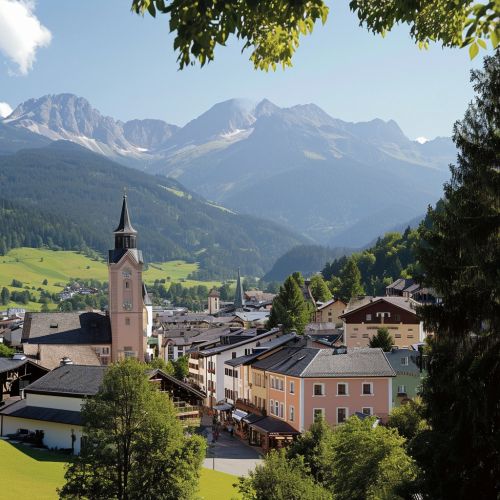Kitzbühel
History
Kitzbühel, one of the most significant and historic towns in the Tyrolean region of Austria, has a rich and fascinating history that dates back to the Bronze Age. The first settlement in the area was established by the Illyrians, an ancient Indo-European people, around 1100 BC. The town's name, Kitzbühel, is believed to have been derived from the term "Chizbuhel", which means "goat hill" in Old High German. This is likely a reference to the wild mountain goats that were once prevalent in the region.

During the Middle Ages, Kitzbühel was a mining town, with silver, copper, and lead being extracted from the nearby mountains. The town's mining industry thrived from the 15th to the 17th century, contributing significantly to its economic growth and development. The town was also a key trading post, with goods from Italy and Germany passing through on their way to other parts of Europe.
In the 19th century, Kitzbühel began to transform into a popular tourist destination. The construction of the Salzburg-Tyrol Railway in 1875 made the town more accessible to visitors, leading to an increase in tourism. The town's stunning natural beauty, combined with its rich history and culture, made it an attractive destination for tourists from around the world.
Geography
Kitzbühel is located in the eastern part of Tyrol, nestled in a valley between the Kitzbüheler Horn and Hahnenkamm mountains. The town is surrounded by the Kitzbühel Alps, a mountain range in the Central Eastern Alps. The region is characterized by its diverse landscape, which includes rolling hills, steep mountain slopes, and deep valleys.
The town's location in the heart of the Alps provides it with a unique microclimate. The summers are typically warm and sunny, while the winters are cold and snowy, making it an ideal location for both summer and winter outdoor activities.
Economy
Kitzbühel's economy is primarily driven by tourism, with the town attracting visitors year-round for its outdoor recreational activities, historic sites, and cultural events. The town is particularly renowned for its winter sports, especially alpine skiing. The annual Hahnenkamm Race, one of the most challenging downhill ski races in the world, attracts thousands of spectators and participants from around the globe.
In addition to tourism, other significant sectors of Kitzbühel's economy include real estate, retail, and services. The town is home to a number of high-end boutiques, restaurants, and hotels, catering to the luxury tourism market. The real estate market in Kitzbühel is also robust, with a high demand for luxury homes and vacation properties.
Culture
Kitzbühel has a vibrant and rich cultural scene, with a number of annual events, festivals, and traditions that reflect its Tyrolean heritage. The town's historic center, with its medieval architecture and cobblestone streets, is home to several museums, art galleries, and cultural institutions.
One of the town's most significant cultural events is the annual Kitzbühel Film Festival, which showcases a diverse range of films from around the world. The town also hosts the Kitzbühel Alpenrallye, a classic car rally that attracts automobile enthusiasts from across Europe.
Traditional Tyrolean music, dance, and cuisine play a significant role in Kitzbühel's culture. The town's restaurants offer a variety of local dishes, including Kitzbüheler Leber (liver), Kitzbüheler Rostbraten (roast beef), and Kitzbüheler Krapfen (a type of doughnut).
Sports
Kitzbühel is internationally renowned as a premier winter sports destination. The town's ski resort, the Kitzbühel Ski Area, is one of the largest and most popular in Austria. It offers a wide range of slopes for all skill levels, from beginner to expert.
The town is perhaps best known for the Hahnenkamm Race, a part of the FIS Alpine Ski World Cup. This race, held on the Hahnenkamm mountain's Streif slope, is considered one of the most difficult and prestigious in the world.
In addition to alpine skiing, Kitzbühel also offers opportunities for cross-country skiing, snowboarding, and winter hiking. During the summer months, the town's outdoor activities shift to hiking, mountain biking, golf, and tennis.
